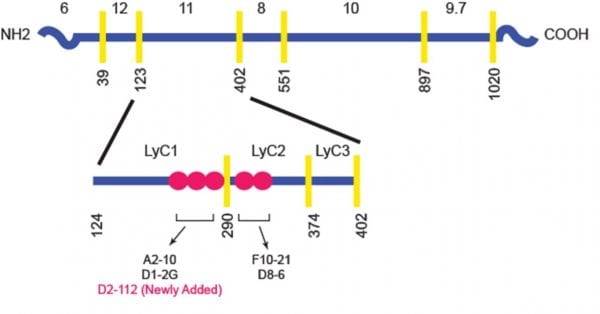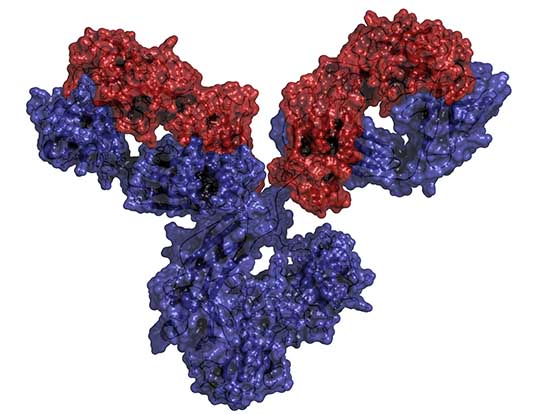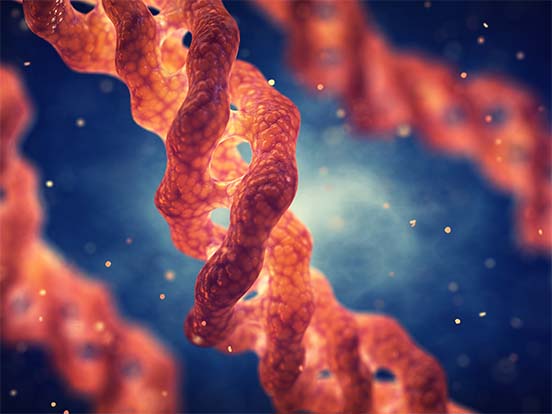Benefits
- Faster results: Severe arthritis is induced within 24-48 hours instead of the 4 weeks required to induce CIA under immunization with type II collagen
- Broad applicability: Unlike the CIA model, which requires a restricted MHC haplotype, the CAIA model can be induced in almost all strains of mice, including CIA-resistant, T-cell deficient, gene knockout, and transgenic mice
- Consistency: The severity of arthritis appears to correlate to the dose of monoclonal antibody cocktail, and more severe and consistent arthritis can be induced by increasing the dose of monoclonal antibody cocktail
CAIA vs. CIA
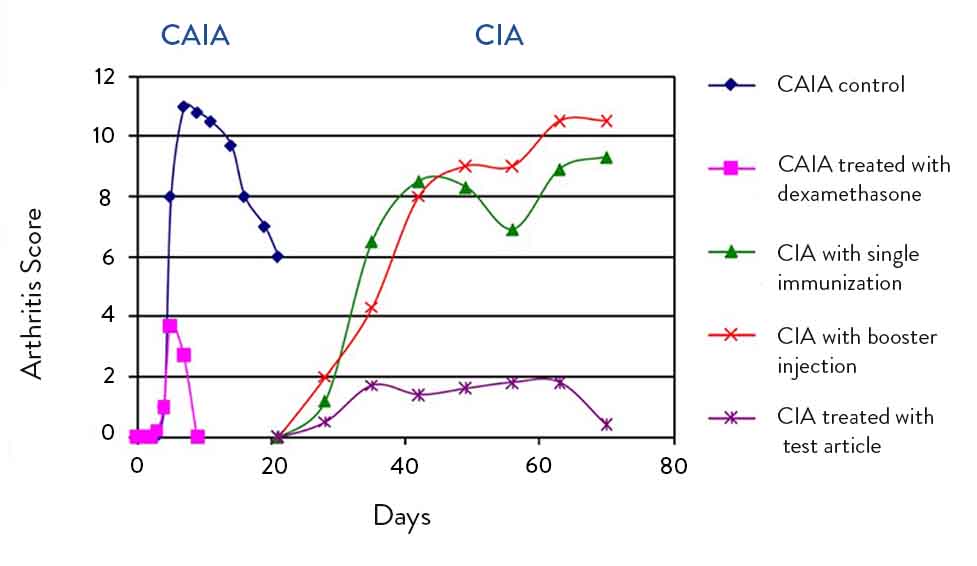
Original 4 Clone Cocktail vs. 5 Clone Cocktail
Original 4-clone cocktail
4-clone cocktail kits have been widely used for CAIA since their appearance in 1998. The original 4-clone cocktail consisting of anti-type II collagen monoclonal antibodies has been used for inducing arthritis in various strains of mice, especially CAIA-high responder strains such as BALB/c and DBA/1 mice.
Newly improved 5-clone cocktail
The new 5-clone cocktail has been developed by adding a new clone to the 4-clone cocktail. Due to the high efficacy of complement fixation, the arthritogenicity of the new 5-clone cocktail is two times greater than the original.
Two of the five clones in this newly developed 5-clone cocktail recognize individual epitopes clustered within the LyC-2 fragment (291-374) and three clones recognize epitopes located within the LyC-1 (124-290) fragment of CB11 (124-402) of type II collagen. These epitopes share common amino acid sequences with many different species of type II collagen including chicken, mouse, rat, bovine, porcine, monkey, and human.
Arthritogenicity of Arthrogen-CIA® 5-Clone Cocktail vs. Competitor
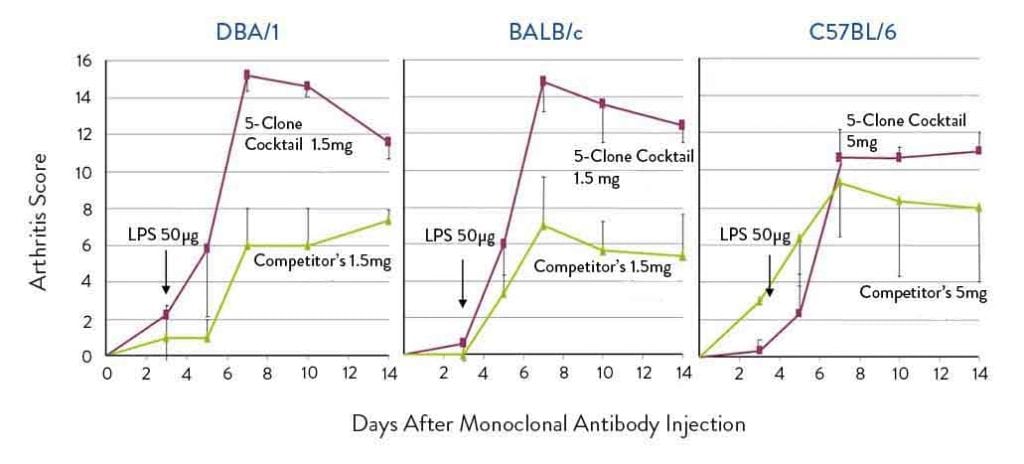
Induction of Arthritis using 5-clone Cocktail without LPS
The new Arthrogen-CIA® 5 clone cocktail is also capable of inducing arthritis without LPS in certain conditions and strains of mice:
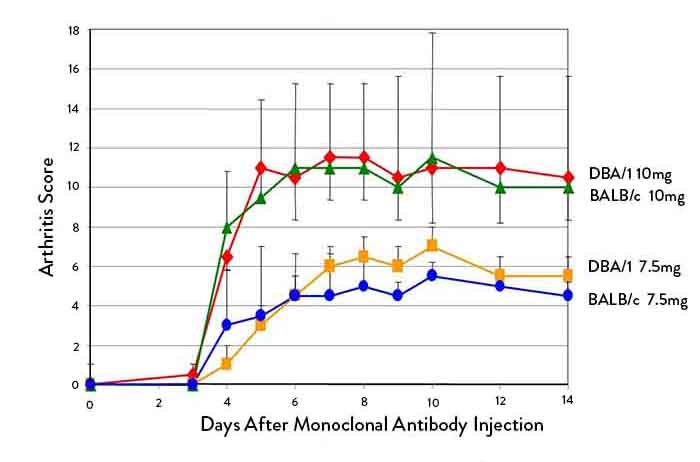
Role of Bacterial Toxins in the Pathogenesis of Autoimmune Arthritis
Arthritogenic monoclonal antibody cocktail induces a similar arthritis to CIA (Figure 4). However, it is unlikely that autoantibodies alone are capable of inducing autoimmune diseases in humans. For example, bacterial toxins, such as lipopolysaccharide (LPS), Staphylococcal enterotoxin B (SEB), and M. arthritidis mitogen (MAM), play a synergistic effect with autoantibodies to type II collagen, and induces severe arthritis in mice (Figure 5). Therefore, the combination of a sub-arthritogenic dose of monoclonal antibody cocktail and LPS has been widely used for inducing severe arthritis at a high incidence in mice for a variety of purposes including the evaluation of therapeutics.
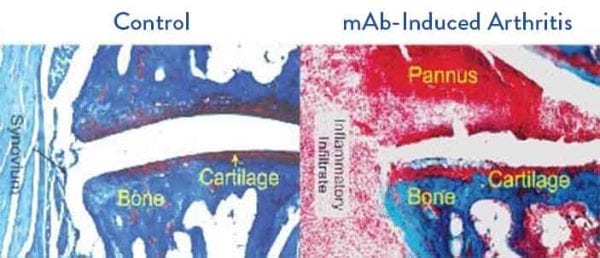
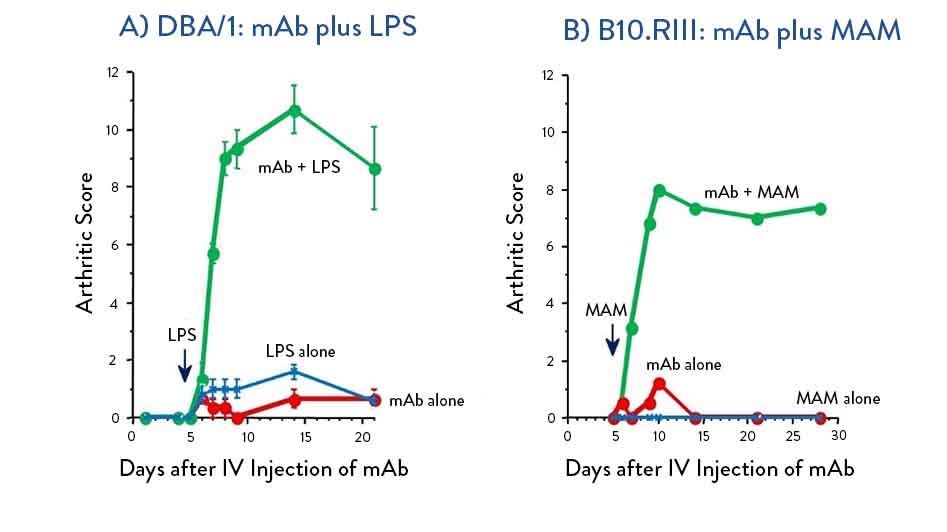
Mouse Strains
CAIA bypasses the requirement for host’s generation of autoantibodies to type II collagen, thus can be induced in mice that do not possess CIA-susceptible MHC-haplotypes (H-2q and H-2r) such as various knockout or transgenic mice. All strains of mice, which are normal with respect to mounting an inflammatory response including complement activation, should be susceptible to CAIA.
| Mouse Strain | H-2 Type | CIA Susceptibility | CAIA Susceptibility | Note |
|---|---|---|---|---|
| DBA/1 | q | High | High | High responder to chick, bovine, human type II collagen, INFg production is high |
| B10.RIII | r | High | High | Low response to chick and human type II collagen |
| B10 | b | Low | (High) | *Need alternative immunization |
| C57BL/6 | b | Low | Moderate | *Need alternative immunization |
| C57BL/6 x 129/Sv | b | Low | Moderate | *Need alternative immunization |
| 129/Sv | b | Resistant | High | - |
| BALB/c | d | Resistant | High | - |
| SJL | s | Moderate | (High) | - |
| CB.17 scid/scid | / | Resistant | High | B and T cell deficient |
Susceptibility of various mouse strains to CIA and CAIA.
Parenthesis: Assumed, but have not tested
* Develop CIA by alternative immunization with CFA containing high concentration of M. tuberculosis.
Using Animal Models: Factors to Consider
The genetic background of mice, even in the same strain, will vary from vendor to vendor and can affect how the animals respond to various reagents, thus impacting the results of your experiment. Therefore, testing animals from different vendors using a defined protocol is recommended before proceeding with a large full-scale experiment.
The bacteria flora is very important to the health of the animal, including the proper functioning of the immune system. Therefore, we recommend housing animals in Specific Pathogen Free (SPF) conditions rather than conventional conditions to avoid variability caused by bacteria.
Arthritogenic Epitopes
The arthritogenic epitopes are not evenly distributed along the type II collagen molecule, but are apparently clustered within certain regions of type II collagen depending on MHC types in mice, such as cyanogen bromide (CB) digested peptide 11 (CB11) in DBA/1 (H-2q) mice and CB8 in B10.RIII (H-2r) mice. Importantly, a similar restriction of autoantibody-CB peptide reactivity is observed in patients with rheumatoid arthritis. For example, autoantibodies from one group of patients dominantly react with CB11, whereas autoantibodies from another group react with CB8 and CB10.
